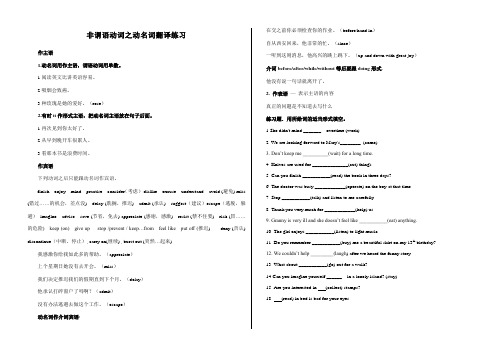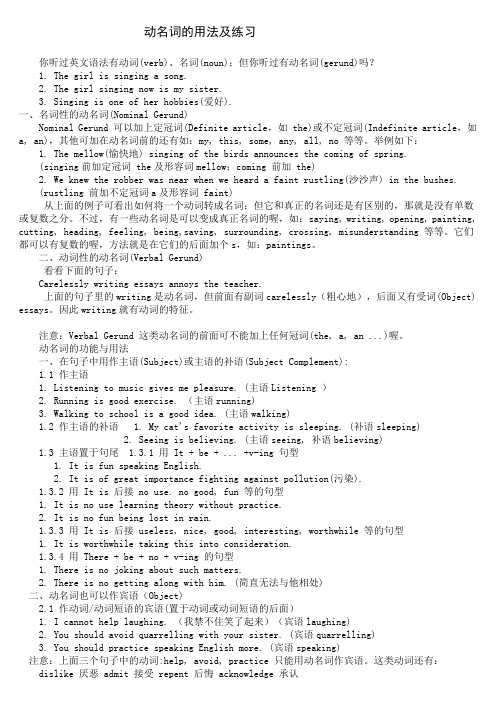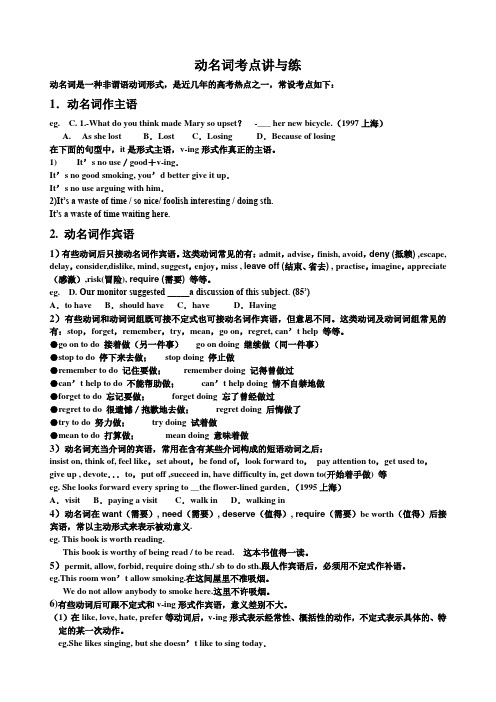(完整word版)动名词的用法及练习题
完整word版,动名词翻译练习题

非谓语动词之动名词翻译练习作主语1.动名词用作主语,谓语动词用单数。
1.阅读英文比讲英语容易。
2.吸烟会致癌。
3.种玫瑰是她的爱好。
(rose)2.有时it作形式主语,把动名词主语放在句子后面。
1.再次见到你太好了。
2.从早到晚开车很累人。
3.看那本书是浪费时间。
作宾语下列动词之后只能跟动名词作宾语。
finish enjoy mind practise consider(考虑)dislike excuse understand avoid (避免) miss (错过……的机会,差点没) delay (耽搁,推迟) admit (承认) suggest(建议)escape(逃脱,躲避)imagine advise save (节省,免去) appreciate (感谢,感激) resist (禁不住要) risk (冒……的危险) keep (on) give up stop /prevent / keep…from feel like put off (推迟) deny (否认) discontinue(中断、停止), carry on(继续) , burst out (突然…起来)我感激你给我如此多的帮助。
(appreciate)上个星期日她没有去开会。
(miss)我们决定推迟我们的假期直到下个月。
(delay)他承认打碎窗户了吗啊?(admit)没有办法逃避去做这个工作。
(escape)动名词作介词宾语: 在交之前你必须检查你的作业。
(before/hand in)自从西安回来,他非常的忙。
(since)一听到这则消息,他高兴的跳上跳下。
(up and down with great joy)介词before/after/while/without等后要跟doing形式.他没有说一句话就离开了。
2. 作表语—表示主语的内容真正的问题是不知道去写什么练习题.用所给词的适当形式填空。
1.She didn't mind _______overtime.(work)2. We are looking forward to Mary's________. (come) .3. Don’t keep me __________(wait) for a long time.4. Knives are used for ______________(cut) things.5. Can you finish ___________(read) the book in three days?6. The doctor was busy ____________(operate) on the boy at that time.7. Stop ___________(talk) and listen to me carefully.8. Thank you very much for ____________(help) us.9. Granny is very ill and she doesn’t feel like ___________(eat) anything.10. The girl enjoys ___________(listen) to light music.11. Do you remember ___________(buy) me a beautiful skirt on my 13th birthday?12. We couldn’t help _________(laugh) after we heard the funny story.13. What about ___________(go) out for a walk?14.Can you imagine yourself ______in a lonely island? (stay)15. Are you interested in (collect) stamps?18. (read) in bed is bad for your eyes.Reading English is easier than speaking it. 。
动名词的用法

动名词的用法及练习你听过英文语法有动词(verb)、名词(noun);但你听过有动名词(gerund)吗?1. The girl is singing a song.2. The girl singing now is my sister.3. Singing is one of her hobbies(爱好).一、名词性的动名词(Nominal Gerund)Nominal Gerund 可以加上定冠词(Definite article,如 the)或不定冠词(Indefinite article,如a, an),其他可加在动名词前的还有如:my, this, some, any, all, no 等等。
举例如下:1. The mellow(愉快地) singing of the birds announces the coming of spring.(singing前加定冠词 the及形容词mellow;coming 前加 the)2. We knew the robber was near when we heard a faint rustling(沙沙声) in the bushes.(rustling 前加不定冠词a及形容词 faint)从上面的例子可看出如何将一个动词转成名词;但它和真正的名词还是有区别的,那就是没有单数或复数之分。
不过,有一些动名词是可以变成真正名词的喔,如:saying, writing, opening, painting, cutting, heading, feeling, being,saving, surrounding, crossing, misunderstanding 等等。
它们都可以有复数的喔,方法就是在它们的后面加个s,如:paintings。
二、动词性的动名词(Verbal Gerund)看看下面的句子:Carelessly writing essays annoys the teacher.上面的句子里的writing是动名词,但前面有副词carelessly(粗心地),后面又有受词(Object) essays。
非谓语动词(动名词、动词不定式)总结及练习(附答案)

非谓语动词(动名词、动词不定式)总结及练习非谓语动词在句子中充当除了谓语....以外其它成份的动词形式,不受人称和数的限制。
在英语中,非谓语动词主要有动名词和动词不定式两种形式。
第一部分动名词1.0动名词是在动词后面+ ing (doing)的形式,把动词变成名词来使用。
比如:live → living, see → seeing, go → going,凡此种种。
2.0 动名词在句子中的成份2.1 动名词做主语e.g. Seeing is believing. seeing为动名词,在句子中做主语Learning Japanese is hard. 为动名词,在句子中做主语2.2 动名词作宾语, 此时多与一些固定的谓语动词作搭配, 见附表e.g. I like reading.He enjoyed living in France.2.3 动名词作介词的宾语,常常与类似如下短语的介词连用,如:dream of, keep awayfrom, be good at, be interested in …e.g. He is interested in drawing. 动名词drawing作in的宾语Please keep away from lying. 动名词lying作from的宾语2.4 动名词作表语e.g. Seeing is believing. 动名词believing作表语My hobby is skating. 动名词skating作表语2.5 动名词作定语, 对修饰的名词形成一种定义e.g. a dining room, a swimming pool, a waiting room…2.6 动名词作状语,逻辑主语须与主句主语报纸一致e.g. Hearing the good news, she couldn’t helping laughing. (时间状语)Having received the letter, I decided to write back. (时间状语)Having been to the Great Wall for many times, he didn’t go last week. (原因状语)Working hard, you will succeed.(条件状语)Though working hard from day to day, he didn’t get rich. (让步状语)2.7 动名词作宾语补足语,常与感官等动词连用e.g. I saw him leavingPlease keep him working.第二部分动词不定式1.0 动词不定式也是一种非谓语动词形式,其结构为“to+动词原形”,其中to不是介词而是动词不定式的符号,动词不定式没有人称和数的变化。
动名词考点讲与练(含答案)

动名词考点讲与练动名词是一种非谓语动词形式,是近几年的高考热点之一,常设考点如下:1.动名词作主语eg. C. 1.-What do you think made Mary so upset?-___ her new bicycle.(1997上海)A. As she lost B.Lost C.Losing D.Because of losing在下面的句型中,it是形式主语,v-ing形式作真正的主语。
1) It’s no use/good+v-ing.It’s no good smoking, you’d better give it up.It’s no use arguing with him.2)It’s a waste of time / so nice/ foolish interesting / doing sth.It’s a waste of time waiting here.2. 动名词作宾语1)有些动词后只接动名词作宾语。
这类动词常见的有:admit,advise,finish, avoid,deny (抵赖) ,escape, delay,consider,dislike, mind, suggest,enjoy,miss , leave off (结束、省去) , practise,imagine,appreciate (感激),risk(冒险), require (需要) 等等。
eg. D. Our monitor suggested _____a discussion of this subject. (85’)A.to have B.should have C.have D.Having2)有些动词和动词词组既可接不定式也可接动名词作宾语,但意思不同。
这类动词及动词词组常见的有:stop,forget,remember,try,mean,go on,regret, can’t help 等等。
动名词的用法(完美版)

高中英语语法之动名词一、含义动名词兼有动词和名词特征的非谓语动词形式。
基本形式为v-ing, 动名词具有名词的性质,因此在句中可以做主语、表语、宾语、定语等。
动名词有时态和语态的变化。
动名词的时态和语态的基本形式:(以write 为例)注意:动名词的否定形式是:not writing二、动名词的基本用法1.用作主语---常表抽象,或者泛指习惯性的动作。
Smoking is bad for your health.Playing with fire is dangerous.Swimming is her favorite sport. 游泳是她最喜欢的体育运动。
Learning is important to modern life. 学习对现代生活很重要。
注意:①不定式也可以做主语。
不定式与动名词作主语的区别:不定式作主语时经常表示具.体.的.、.一.次.性.动作,而动名词作主语时经常表示抽象动作或习惯性动作。
Getting up early is a good habit.To get up early this morning made me sleepy.②动名词作主语,有时用it作形式主语,把动名词置于句末。
It is no use/ good doing...(做。
没有用);It is fun doing... (做。
很有趣);It is a waste of time doing... (做。
是浪费时间)等句型中。
例如:It's no use crying over spilt milk.(覆水难收)It is fun playing with children. 和孩子们一起玩真好。
1It is a waste of time persuading such a person to join us.说服这样一个人加入我们当中来是浪费时间。
2.作宾语① 作某些及物动词的宾语常见的动词有:advise,avoid,delay,escape,excuse,enjoy,consider,finish,deny,fancy,keep,mind(在乎)postpone,pardon,practise,suggest,imagine 等。
(完整word版)动名词

动名词一、动名词及动名词短语的构成2.否定式:not +动名词(doing)的各种形式3.动名词的复合结构动名词具有动词的特征,因此它可有自己的逻辑主语。
如果需要指出动名词动作的发出者,可在动名词前加一物主代词、名词所有格、名词或人称代词宾格来修饰,表示动名词逻辑上的主语,这样就构成了动名词的复合结构。
1.Do you mind my(me) making a suggestion?2.Their coming to help was a great encouragement to us.3.My daughter’s staying up so late worried me.4.I know nothing about the window being open.5.Are you disappointed at there not being more gifts?6.She was awakened by someone knocking at the door.二、动名词的句法功能(一)动名词作主语1.动名词作主语多表示经常性的、习惯性的动作。
1.Swimming has its laws.2.Talking mends no holes.空谈无济于事。
3.Learning without practice is no good.2. 动名词作主语,有时句中使用形式主语it而将真正主语(动名词)放到句尾。
常用的结构有:It is +n. + doing.It is + adj. + doingThere is (was) no doingIt is no use writing to him; he never answers letters.It is good playing chess after supper.There is no holding back the wheel of history.适用于It is以上结构的名词(短语)有:no use, no good, fun, a waste (of time), a great pleasure, 等形容词有:useless, nice, good, interesting, worthwhile, foolish, dangerous 等。
(完整版)动名词的用法(完美版)(可编辑修改word版)
高中英语语法之动名词一、含义动名词兼有动词和名词特征的非谓语动词形式。
基本形式为v-ing, 动名词具有名词的性质,因此在句中可以做主语、表语、宾语、定语等。
动名词有时态和语态的变化。
动名词的时态和语态的基本形式:(以write 为例)注意:动名词的否定形式是:not writing二、动名词的基本用法1.用作主语---常表抽象,或者泛指习惯性的动作。
Smoking is bad for your health.Playing with fire is dangerous.Swimming is her favorite sport. 游泳是她最喜欢的体育运动。
Learning is important to modern life. 学习对现代生活很重要。
注意:①不定式也可以做主语。
不定式与动名词作主语的区别:不定式作主语时经常表示具体的、一次性动作,而动名词作主语时经常表示抽象动作或习惯性动作。
Getting up early is a good habit.To get up early this morning made me sleepy.②动名词作主语,有时用it 作形式主语,把动名词置于句末。
It is no use/ good doing...(做。
没有用);It is fun doing... (做。
很有趣);It is a waste of time doing... (做。
是浪费时间) 等句型中。
例如:It’s no use crying over spilt milk.(覆水难收)It is fun playing with children. 和孩子们一起玩真好。
It is a waste of time persuading such a person to join us.说服这样一个人加入我们当中来是浪费时间。
2.作宾语①作某些及物动词的宾语常见的动词有:advise,avoid,delay,escape,excuse,enjoy,consider,finish,deny,fancy,keep,mind(在乎)postpone,pardon,practise,suggest,imagine 等。
(完整版)动名词讲解与练习
非谓语动词之动名词一定义动名词,就是动词后加ing 的形式,即doing sth. 它的作用相当于一个名词,因此叫做“动名词”。
动名词的否定形式在动名词前加not 。
二.动名词 ing 形式的变化规则。
1.一般在词尾直接加 ing 。
2.以不发音的 e 结尾的动词,去掉 e 再加 ing。
3.以重读闭音节结尾,末端只有一个辅音的动词,要双写最后一个字母后加ing。
4.少量以 ie 结尾的动词,变 ie 为 y,再加 ing 。
三作用一)作主语1.动名词用作主语,谓语动词用单数。
.Reading French is easier than speaking it.阅读法文比讲法语简单。
Talking to him is talking to a wall.和他说话等于对牛抚琴。
Smoking can cause cancer. 抽烟会致癌。
Growing roses is her hobby.种玫瑰是她的喜好。
2.有时 it 作形式主语,把动名词主语放在句子后边。
It ’ s nice seeing you again再.次见到你太好了。
It was tiring driving from morning till night.从早到晚开车很累人。
It ’ s a wonder meeting you here.在这里遇到你真是奇观。
It was a waste of time reading that book.看那本书是浪费时间。
3.动名词的复合构造作主语当动名词有自己的逻辑主语时,常能够在前面加上一个名词或代词的全部格,构成动名词的复合构造(这时,名词或代词的全部格做动名词的逻辑主语 ) 。
动名词的复合构造也能够在句中作主语。
注意比较下边两个句子的差别与联系:I don’ t mind smoking here.I don’ t mind his smoking here.注意:在口语中,假如动名词复合构造作宾语,此中的物主代词常用人称代词宾格,名词全部格常用名词一般格来取代,但在句首做主语时不可以这样来取代。
(完整word)知识点动名词,推荐文档
●动名词一、动名词概述动名词构成:是由动词原形+ ing 构成,动名词的否定形式:not + 动名词He pretends not knowing it at all. 他假装全然不知。
We considered not doing it now. 我们考虑现在不做这件事。
动名词的被动形式:(当动名词和它的逻辑主语是被动关系时,用动名词的被动形式来表示。
)His being looked down upon made him sick.I can't really stand being treated like that.The doctor is used to being woken up at midnight.He hates being interrupted when he is speaking .动名词复合结构:物主代词(或名词所有格)+ 动名词Your going there won’t help much.I don’t like your being late.这种结构相当于主谓结构,可在句子中做主语或宾语;物主代词(或名词所有格)则称作动名词的逻辑主语。
二、动名词的作用:同现在分词形式一样,具有动词和名词的性质,在句中可作主语,宾语,表语和定语。
1.动名词作主语:Talking like that is not polite.Learning from others is important .Putting on more clothes is not so good .考点:动名词可以象动词不定式一样,用it 先行祠代替,而把动名词写在后面。
It's no use waiting here, let's go home.It's very difficult climbing this mountain.注意:常用于it做形式主语的adj 有:good, foolish, wonderful, useless, difficult, nicen.有:fun, luck, pleasure, relief , mistake, pain, use, goodimportant, necessary, essential, impossible等只能用to do 常用句型:There is no + 动名词….是不可能的There is no knowing how the ancient Egyptians built the pyramids.It is no use/ good+ 动名词. …是没用的It is no use regrettingNo +动名词:No littering! No parking!2.动名词作宾语做及物动词(vt)的宾语,它们是begin, mind, suggest, finish, stop, need, enjoy, miss,keep. (不全)Please stop smoking in the house.I like reading in the forest.Do you mind my opening the windows?做介词宾语:(相关短语)Be fond of;because of3.动名词作定语。
(完整word)非谓语动词——动名词
第十五讲:非谓语动词--动名词教学重点:掌握动名词这一语法知识。
了解这一语法知识在高考中的应用。
命题趋势:动名词的考点依次为作宾语,作主语,作定语,作表语。
一些固定的基本知识应记牢.知识点回顾在句子中充当除谓语以外的句子成分的动词形式叫做非谓语动词。
非谓语动词分为三种形式:不定式,动名词,和分词(分词包括现在分词和过去分词)。
动名词1.动名词简述:动名词是三种非谓语动词的一种。
由动词+ing构成,与现在分词的形式相同。
动名词在句中可以作主语、宾语(介词宾语和动宾)和表语,还可以作定语。
同时,动名词仍然具有动词的若干特点,它可以有自己的宾语和状语.2。
1动名词作主语Talking mends no holes.空谈无济于事。
Seeing is believing。
眼见为实。
Having done the work is an experience you’ll never forget。
做过这种工作,就会使你永生难忘。
注意:动名词作主语时,谓语动词一律用单数。
(详见上三例)2。
1。
1用It作形式主语用动名词作主语时,和动词不定式一样,有时也用It作形式主语。
It is no use (useless) talking too much. = Talking too much is no use (useless)。
It is no good crying.= Crying is no good。
It trains the ear listening to music。
= Listening to music trains the ear.2.1.2在there be句型中只能用动名词作主语(不用不定式)There is no + --—ing. (….。
是不可能的)= It is impossible to…。
= No one can….。
There is no telling what will happen.= It is impossible to tell what will happen。
- 1、下载文档前请自行甄别文档内容的完整性,平台不提供额外的编辑、内容补充、找答案等附加服务。
- 2、"仅部分预览"的文档,不可在线预览部分如存在完整性等问题,可反馈申请退款(可完整预览的文档不适用该条件!)。
- 3、如文档侵犯您的权益,请联系客服反馈,我们会尽快为您处理(人工客服工作时间:9:00-18:30)。
动名词(Gerund)动名词是动词的一种非谓语形式,由动词+ ing构成,否定形式为not doing,兼有动词的特征和名词的功能。
一、动名词保留着动词的特征,有时态和语态的变化。
其时态语态形式如二、动名词相当于名词,在句中主要作主语、宾语、表语和定语1、作主语动名词是由动词变化而来,所以,动名词的意义往往是表示某个动作或某件事情。
例如:Walking is good exercise. 走路是很好的运动Seeing is believing. 眼见为实。
Smoking may cause cancer. 吸烟可能导致癌症。
Coming to Hangzhou by train takes about 16 hours.乘火车到杭州要16个小时。
Swimming develops the muscles. 游泳可以发展肌肉。
注意:动名词作主语时,对于一些比较长的动名词短语,一般采用"It is …"和"There is …"两种句式来表示。
例如:It takes me ten minutes to get home from my office.我从办公室回家要花十分钟。
It needs time to make three copies of it.把它复制三份需要时间。
It's nice talking with you. 和你谈话很高兴。
It's no use arguing with him. 跟他争论没用。
It is no good learning without practice.学而不实践是没好处的。
There is no joking about such matters.这种事开不得玩笑。
There is no denying that she is very efficient.她效率高是不容否认的。
2、作定语动名词作定语的情况并不是很普遍,一般只限于单个的动名词作定语,表示“用于……的”或表示“处于某件事情中的……”含义。
例如:swimming pool 游泳池reading material 阅读材料walking stick 手杖floating needle 浮针opening speech 开幕词listening aid 助听器waiting room 候车室working people 劳动人民3、作表语动名词作表语的时候,特别要注意:不要与正在进行时混淆。
动名词作表语,表达的是“某件事”等。
例如:His part-time job is promoting new products for the company. (动名词)他的业余工作是为那家公司推销新产品。
Reading is for sure learning, but applying is also learning to a greater extent.(动名词)读书当然是学习,然而运用在很大程度上更是学习。
注意:动名词作表语,容易与现在分词作表语相混淆。
记住:动名词表语表达的是“某件事”(与不定式短语的意义相近),而现在分词表语表示“具有某个作用”。
例如:The situation is very much encouraging.(现在分词)形势非常令人鼓舞。
His present job is not that stimulating as he expected. (现在分词)他现在的工作并不是那么有刺激性。
Their plan is to build another dormitory for their staff this year. (不定式)他们的计划是今年再为员工们建一栋宿舍楼。
His wish is to become a pilot. (不定式)他的愿望是当飞行员。
4、作宾语。
动名词既可以作动词的宾语,也可以作介词的宾语。
例如:He is fond of playing football.I like swimming.①在下列动词或词组后可以用动名词作宾语,但不能用不定式:admit,appreciate,avoid,consider,delay,deny, dislike,enjoy,escape,excuse,face,feel like,finish,forgive,give up,imagine,include,keep,mention,mind,miss,practise,put off,resist,risk,suggest,can’t help(情不自禁)等。
②下列动词或词组可带动名词或不定式作宾语,但意义上有区别:forget,go on,mean,regret,remember,stop,try。
例如:Let’s go on studying Lesson 6.(让我们继续学第六课。
说明前面已学了一部分。
)Let’s go on to study Lesson 6.(让我们接着学第六课。
说明前面已学了第五课。
)I remember doing the exercise. (我记得做过练习。
)I must remember to do it. (我必须记着做这事。
)I tried not to go there. (我设法不去那里。
)I tried doing it again. (我试着又干了一次。
)Stop speaking. (不要讲话。
)He stopped to talk. (他停下来讲话。
)I mean to come early today. (我打算今天早些来。
)Missing the train means waiting for another hour.(误了这趟火车意味着再等一个小时。
)③在allow,advise,forbid,permit等动词后直接跟动名词形式作宾语,如果后面有名词或代词作宾语,其后用动词不定式作宾语补足语。
如:We don’t allow smoking here.We don’t allow students to smoke.④动词need,require,want作“需要”解,其后必须用动名词的主动形式或不定式的被动形式作宾语表示事情需要做,这时,动名词的主动式表示被动意义。
be worth后必须用动名词的主动形式来表示被动意义。
如:The window needs/requires/wants cleaning/to be cleaned.Her method is worth trying.⑤在短语devote to,look forward to,stick to,to be used to,object to,thank you for,excuse me for,be(kept) busy,have difficulty/trouble/problem(in),have a good/wonderful/hard time(in),there’s no use/good/need,feel/seem like/get down to 等后的动词也必须用动名词形式,例如:I look forward to hearing from you soon.⑥在love,hate,prefer,like等动词后用动名词或不定式无多大区别。
有时用动名词作宾语时,指一般情况,而跟不定式作宾语时指某一具体行为。
⑦start,begin,continue在书面语中多后接动名词,在口语中多后接不定式。
但start和begin在下列情况下一般跟不定式作宾语:当主语是物而不是人时;当start或begin以-ing形式出现时,当后面作宾语的动词表示感情、思想或意念时。
如:It started to snow. He is beginning to cook dinner. I began to understand what he meant.⑧在should(would) like/love等后须用不定式。
2,练习题Ⅰ、单项选择:1. No one enjoys _______ at.A. laughingB. to laughC. being laughedD. to be laughed2. You must do something to prevent your house _______.A. to be broken inB. from being broken inC. to break inD. from breaking in3. They insisted on _______ another chance to try.A. givenB. givingC. being givenD. to be given4. --- Where is my passport? I remember _______ it here.--- You shouldn't have left it here. Remember _______ it with you all the time.A. to put;to takeB. putting;takingC. putting;to takeD. to put;taking5. His room needs _______, so he must have it _______.A. painting;paintedB. painted;paintingC. painting;paintingD. painted;painted6. After finishing his homework he went on _______ a letter to his parents.A. writeB. writingC. wroteD. to write7. The young trees we planted last week require _______ with great care.A. looking afterB. to look afterC. to be looked afterD. taken good care of8. Only _______ English doesn't mean _______ the language.A. to learn;to learnB. learning;learningC. learning about;learnD. learning about;learning9. She returned home only to find the door open and something _______.A. missedB. to be missingC. missingD. to be missed10. She decided to devote herself _______ the problem of old age.A. to studyB. studyingC. to studyingD. study11. Remember _______ the newspaper when you have finished it.A. putting backB. put backC. to put backD. be put back12. As she is looking forward to _______ from me, please remember _______ this letter on your way to school.A. hear;postB. hearing;to postC. be heard;postingD. be hearing;to posting13. Grandma said that she had a lot of trouble _______ your handwriting.A. to readB. to seeC. readingD. in seeing14. Writing stories and articles _______ what I enjoy most.A. isB. areC. wasD. were15. We appreciate _______ us to the ball.A. them to inviteB. to inviteC. their invitingD. being invited16. Would you mind _______ quiet for a moment? I'm trying _______ a form.A. keeping;filling outB. to keep;to fill outC. keeping;to fill outD. to keep;filling out17. He was afraid _______ for being late.A. of seeingB. of being seenC. to be seenD. to have seen18. I'd like to suggest _______ the meeting till next week.A. to put offB. putting offC. put offD. to be put off19. I don't see how I could possibly manage _______ the work without _______.A. finish;helpingB. to finish;being helpedC. finishing;helpingD. finishing;being helped20. Anything worth _______ is worthy of _______ well.A. doing;being doneB. doing;doingC. to be done;to be doneD. to be done;being done21. We advised them to take a rest, but they insisted _______ the work.A. finishB. to finishC. in finishingD. on finishing22. I delayed _______ your letter because I had been away for a week.A. answerB. answeringC. writingD. to post23. The thief drove as fast as he could to escape _______ by the police.A. to be caughtB. be caughtC. being caughtD. catching24. I searched for my wallet and it wasn't there. At first, I thought I _______ it at home. Then I remembered _______ it out to pay for the taxi.A. must have left;to takeB. may leave;takingC. might leave;to takeD. could have left;taking25. _______ the news of his father's death, he burst into tears.A. After hearingB. On hearingC. While hearingD. Having heard26. _______ his mother, the baby could not help _______.A. To see;to laughB. Seeing;to laughC. Seeing;laughingD. To see;laughing27. It's no use _______ so much money on clothes.A. spendB. spentC. spendingD. being spent28. The sentence needs _______.A. improveB. a improvementC. improvingD. improved29.If he succeeded _______ a job, his children wouldn't be suffering from hunger now.A. to findB. to look forC. in findingD. in looking for30.I still remember _______ to my home town when I was young.A. takingB. takenC. being takenD. to takeⅡ、填入动词的适当形式:1. Can you imagine yourself _______ in a lonely island? (stay)2. I can't understand your _______ at that poor child. (laugh)3. She didn't mind _______ overtime. (work)4. To make a living, he tried _______, _______, and various other things, but he had failed in all. (write; paint)5. We are looking forward to Mary's _______. (come)6. She was praised for _______ the life of the child. (save)7. She ought to be praised instead of _______. (criticize).8. Is there any possibility of our _______ the championship? (win)9. He came to the party without _______. (invite)Ⅲ、将下列句子译成英语:1.我最喜欢的运动是游泳。
